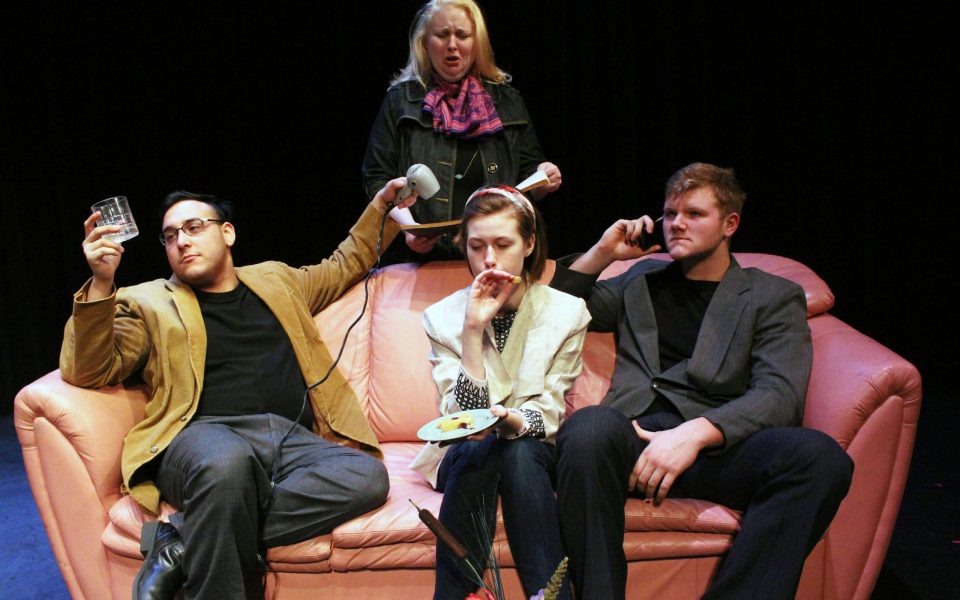In a chic living room, two buttoned-up couples gather for coffee and polite chat before discussing an incident of violence that took place between their children. It’s not apparent underneath the slight tension that soon the story will devolve into the most deplorable of human flaws clashing in one glorious explosion, covering the floor with purse contents, vomit, a whole vase full of tulips and not a small amount of rum.
That gradual and unexpected unraveling comprised much of the fun of God of Carnage by Yazmina Reza, which ran at GTCC’s new creative and performing arts theater in downtown High Point last weekend. In the same way the new building is tucked inconspicuously into GTCC’s jumble of a downtown campus, discovering the quality of theater on display at the community college was an unexpected, delightful surprise.
The small cast of four — Kelly June Hutcheson and Kristian Gonzales as the Novak family, and Abigail Fisher and Caleb Terry as the Raleighs — were each marvelously unlikeable and sympathetic in turns during the opening night of the production on April 21. Barring a missed cue or two and somewhat stilted blocking, their performances wouldn’t be out of place at other more well-known theater programs in the Triad.
It helped that the script is fantastic. God of Carnage is relatively new to the world as far as plays go, having premiered 10 years ago. It won the 2009 Tony award for Best Comedy, and the script’s deft management of the absurdities of modern human interaction makes such a recognition well deserved. Gratingly passive-aggressive lines weave a plot told just as much through its subtext, which is where the play especially succeeded last weekend.
Joshua Waterstone, a newly minted theater instructor as of this semester, directed the production. His acting and teaching career geographically spans much of the Southeast, including tenures at Forsyth Tech and Georgia Shakespeare. Now, in downtown High Point, he’s hoping the space can serve as another point of access and connection for local performance arts.
“This was our first show as a department with new leadership,” Waterstone said in an interview after the play. “We just moved over to High Point campus this semester [from] Jamestown… I think a lot of people, even in High Point, do not know that there is a theater there.”
Perhaps there’s a lack of knowledge not just in the city at large, but among GTCC’s own students; as the crowd filtered out after the show ended, a student outside inquired as to what night-class had just let out, then confessed to not knowing the theater existed. On opening night, only half of the 82 seats were filled, but those in attendance made up for the deficit by gut-laughing with the zeal of a paid studio audience — one particularly invested guest regularly muttered “Oh, no” under their breath at tenser moments.
Those interactions carried the energy of the play, which was paced to lull the viewer into a false sense of peace right before plunging to a new level of depravity every few minutes. For instance, the women in the play went from giggling at their husbands on the couch together to cursing while dumping out the contents of a purse in what felt like nanoseconds.
That old phrase about humor only being funny if it contains truth? It applies. That reality made some of the laughs harder to stomach, especially those about Michael Novak’s regret of being a parent (A chilling line spoken with no hyperbole: “Children consume our lives and destroy them.”) and Veronica’s faux political correctness masking her craving for utter control.
Terry, an automotive major in his debut stage appearance, was perfectly frustrating in his role as the unfeeling and cold Alan Raleigh, a pharmaceutical lawyer who indiscriminately answered his cellphone no matter what was going on in the room. His blasé attempts to defuse drama and detach with disingenuous philosophical mini-lectures would give one a vague sense of Barney Stinson déjà vu. Hopefully he’ll continue to appear on GTCC’s stage.
Fisher, as Raleigh’s volatile wife, Annette, utilized body language to convey her character’s internal struggle between protecting herself with a veneer of polite acquiescence and erupting in spurts of intense anger. Watching her gradual deterioration into full-blown wild woman was the second most enjoyable part of the production, trumped by what was the best scene of the play, in which Veronica Novak, played by Hutcheson, unexpectedly attacked her husband with couch pillows and a bloodcurdling scream.
“I’m starting to like you,” Alan Raleigh quipped.
It was a refreshing moment of honesty pointedly illustrating the thesis of God of Carnage: The capacity for violence resides in each of these four people, and is only barely hidden by the socialized sheen of polite society. It’s an unattractive mirror to hold.
Photo: The cast of GTCC’s “God of Carnage” from left to right: Kris Gonzalez, Kelly Hutcheson, Abigail Fisher and Caleb Terry. (Photo credit: Joshua Waterstone/GTCC)
Join the First Amendment Society, a membership that goes directly to funding TCB‘s newsroom.
We believe that reporting can save the world.
The TCB First Amendment Society recognizes the vital role of a free, unfettered press with a bundling of local experiences designed to build community, and unique engagements with our newsroom that will help you understand, and shape, local journalism’s critical role in uplifting the people in our cities.
All revenue goes directly into the newsroom as reporters’ salaries and freelance commissions.


Leave a Reply